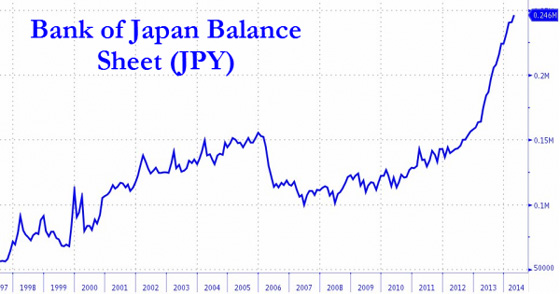The Japanese Debt Economy
Economics / Japan Economy May 14, 2014 - 02:19 PM GMTBy: BATR
 What does the United States have in common with Japan’s economy? Demographics of an aging population have consequences for both countries. As Japan News reports, National debt hits record high.
What does the United States have in common with Japan’s economy? Demographics of an aging population have consequences for both countries. As Japan News reports, National debt hits record high.
"Japan’s national debt totaled a record-high ¥1.02 quadrillion as of the end of March, up ¥33.36 trillion from a year earlier, the Finance Ministry said.
The central government debt, which increased ¥7.01 trillion from the end of December last year, kept rising mainly due to ballooning social security costs in line with the aging of the population."

Last year Forbes viewed their debt crisis as staggering. "Currently at 240% of GDP, the International Monetary Fund estimates that it will get to 250% by year-end. Why is this an issue? Well, when you have government debt at 24x government revenue and interest expenses taking up 25% of government revenue, it becomes a very big issue."
Around the same time, Matt Phillips wrote that With a quadrillion in debt, there’s only one way out for Japan, jumpstart growth.
"So, yes, while Japan does have a ton of debt, the outright level is not the best way to keep track of it. The more important gauge is debt as a percentage of the country’s annual economic output, or GDP. And at more than 200%, Japan’s debt load is the highest among all developed nations.
But still, how will Japan ever manage to pay it off it’s debt? Well, actually, it won’t.
The goal for countries isn’t paying off debt, it’s getting its debt-to-GDP ratio in better shape."
Added to this sluggish and lackluster forecast, the WSJ article that Japan Current Account Surplus Smallest on Record, indicates a serious downward trend in foreign trade earnings.
"The ¥789.9 billion ($7.76 billion) surplus in the broadest measure of a nation's trade with the rest of the world was sharply lower than the ¥4.2 trillion surplus registered a year earlier, data from the Ministry of Finance showed Monday. Until recently, the country routinely produced a surplus in excess of ¥10 trillion a year."
Is the day on the horizon when Japan will mirror the trade deficits that have so long plagued the American economy? Just look to the practice that many Japanese manufacturers are shifting their production offshore. Besides, the aftermath of the Fukushima nuclear disaster has the country consuming more imported fossil fuels to meet energy needs.
Currency weakness has contributed to soaring energy prices, and the recent sales tax increase will effectively exacerbate inflation and crimp consumer spending. So despite an escape from the jaws of deflation, problems persist in Japan.
In fact, it’s likely that Japan has stagnated because of 15 years of zero interest rate policy (ZIRP), not in spite of ZIRP."
The rise in nationalistic sentiments may well be a response to economic dislocations. However, when you compare the economic policies of Japan with the United States, there are similarities in monetary and fiscal approaches. As Japanese companies follow the example of American corporations by moving investments offshore to benefit from lower wages and be closer to consumers, the prospects of a Japanese economic rebound seems just as remote as in America.
"If Japan's current account surplus turns into a current account deficit, the country will have to attract money into its financial markets in order to pay its bills. That may be difficult given that Japan has some of the lowest interest rates and highest debt in the world. Interest rates would probably have to rise substantially, which would worsen the government's finances and could cause a crisis – causing the yen to weaken even further.
To make matters worse, if the government is successful in its drive to raise the inflation rate, that will only further reduce the real interest rate on Japanese bonds, which is already the lowest of the major bond markets. That's going to be a hard sell and that's why I expect the yen to trend lower over the next several years."
James Hall – May 14, 2014
Source: http://www.batr.org/negotium/051414.html
Discuss or comment about this essay on the BATR Forum
"Many seek to become a Syndicated Columnist, while the few strive to be a Vindicated Publisher"
© 2014 Copyright BATR - All Rights Reserved
Disclaimer: The above is a matter of opinion provided for general information purposes only and is not intended as investment advice. Information and analysis above are derived from sources and utilising methods believed to be reliable, but we cannot accept responsibility for any losses you may incur as a result of this analysis. Individuals should consult with their personal financial advisors
BATR Archive |
© 2005-2022 http://www.MarketOracle.co.uk - The Market Oracle is a FREE Daily Financial Markets Analysis & Forecasting online publication.



